Monday, June 27th, 2022
Water Safety
Officials preach common sense and life jackets
By Erin Gardner
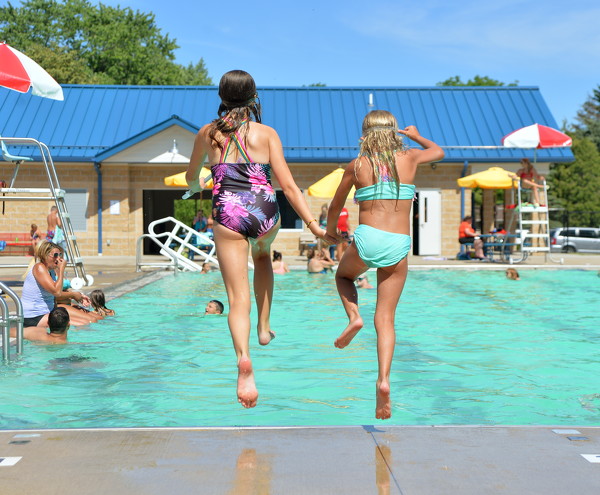
Photo by Paige Sutter/The Daily Standard
Ginny Grimm and Hailey Taylor of St. Marys hold hands as they jump into the St. Marys pool on Friday afternoon.
CELINA- Area officials hope for a safe summer in and on the water.
Life jackets save lives
The most important safety measure one can practice while on the water is to wear a life jacket, said Don Siler of the Ohio Department of Natural Resources Division of Parks and Watercraft.
"We've had several issues already this year where people aren't wearing life jackets," he said. "If you're in a boat or you're swimming at a beach, if you're a weak swimmer, you always need to have a life jacket. It's always recommended."
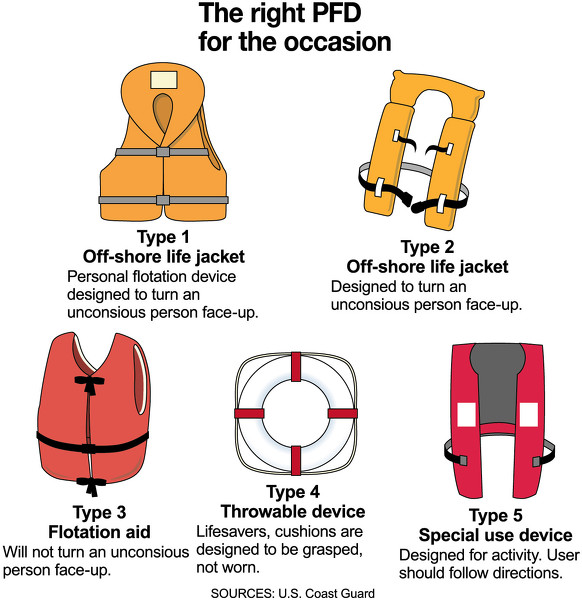
Photo by Bill Thornbro/The Daily Standard
The right PFD for the occasion
Life jackets need to be Coast Guard approved, the right size and accessible on the boat, Siler added.
State law requires children under 10 on a vessel under 18 feet long to wear a life jacket. Adults on a tube or a Jet Ski are also required by law to wear a life jacket, Siler pointed out.
Boating deaths in Ohio more than doubled in 2020, according to ODNR. Fifteen people died in boating fatalities in 2021 and 26 in 2020, up considerably from the 13 reported boating deaths in 2019 and 17 reported in 2018, ODNR figures show.
Drowning was cited as the cause of death for six of the 15 Ohio deaths in 2021. And of the 15 deaths, only two of the victims were wearing life jackets, while 10 were not wearing life jackets or did not wear them correctly, according to ODNR. Three deaths are still under investigation.
"We're just asking people to make good decisions before they go out," Siler said. "If you do go out, make sure you have a life jacket on."
Siler said there have been no drowning incidents on Grand Lake this year.
Boat sober
Boating under the influence of alcohol is frequently a cause of fatal accidents.
"Balance is one of the first things you lose when you consume alcohol," ODNR's website states. "When you combine loss of balance with the rocking of a boat, the chance of falling overboard increases. The sun causes you to perspire, which removes the water from your body but leaves the alcohol in. This can cause a quicker and higher level of impairment."
Siler agrees alcohol is a big issue.
"We ask to keep alcohol at home. (At) state parks, it's illegal to have (alcohol) unless you're in like a private dwelling. We ask people to keep the alcohol at home and enjoy the safe day," he said.
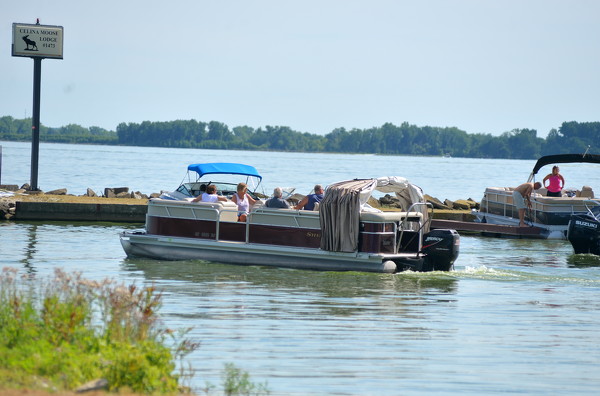
Photo by Paige Sutter/The Daily Standard
Boaters enjoy the lake along the docks of the Celina Moose Lodge on Friday afternoon.
Beware of obstructions
Siler said boaters should be aware of the islands and rock jetties on the lake. At night, boaters should be aware of background lights, the 10 mph speed limit and having navigation lights on.
"Our officers are out there making sure people have their navigation lights on so people know what they're looking at, what to look for and how to operate," he said.
Above all, Siler stresses the importance of knowing the locations of no-wake zones.
"We encourage boaters to stop and read the buoys. That way you're not going into a beach area where people are swimming or a no-wake zone where your wake could potentially cause damage to somebody's property or potentially a person as well," he said.
Boaters should also check equipment before getting on the water, let family and friends know of the destination and return time and use an engine cutoff device, which is a proven safety device to stop the boat's engine should the operator unexpectedly fall overboard, according to ODNR.
Additionally, they should watch the weather, pay attention, know the destination and travel at safe speeds and keep in touch via cell phones, satellite phones, EPIRB or personal locator beacons and VHF radios.
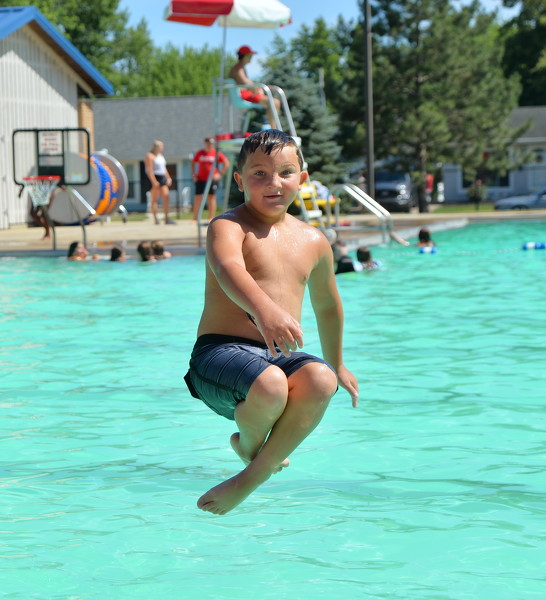
Photo by Paige Sutter/The Daily Standard
Ryker McEldowney of St. Marys cannonballs into the pool.
Pathogens in pools
Swimming is a perfect summertime activity. However, dangers can lurk in swimming pools.
Michelle Kimmel, director of environmental health at Mercer County Health District, said it's important for people to stay out of the pool if they're feeling sick.
"If you're sick, especially having gastrointestinal symptoms (like) diarrhea, you shouldn't be swimming or having your kids swim," she said. "That can be one of the causes of cryptosporidium in recreational water and we see it pop up pretty much every summer somewhere."
According to the CDC, cryptosporidium (crypto) is a disease that causes watery diarrhea. Symptoms include stomach cramps, dehydration, nausea, vomiting, fever and weight loss and they typically begin two to 10 days after becoming infected. Symptoms usually last one to two weeks
"It's reported that people who come up with crypto have been in the pool and then other people that have also been in the pool come up with it and then there's an outbreak affiliated with a certain pool," Kimmel said. "It's not a case where the pool was not operating properly. It really can happen to any even well-run pool because crypto is more chlorine-resistant than other types of organisms. Even a pool that had the proper disinfectant levels in it that are required by the code, crypto can survive in it."
Pool officials, though, can take mitigating actions once they learn of the presence of crypto in the water.
"There's treatment methods that occur, but it requires the pool to close down for a day or so and really raise their chlorine level up really high and then let water work through the filters to remove the organism," Kimmel said. "That's one of the bigger concerns with swimming pool water is the cryptosporidium."
Role of lifeguards
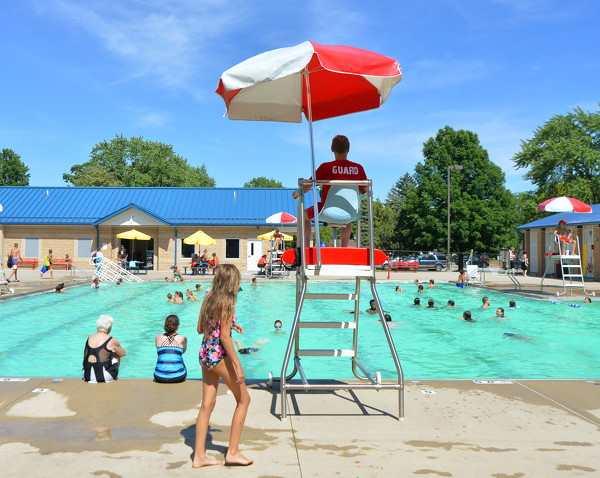
Photo by Paige Sutter/The Daily Standard
Lifeguard Alexander Hoenie of St. Marys watches over swimmers at the St. Marys pool Friday afternoon.
Lifeguards are trained to handle various aquatic situations from preventing disease transmission to administering CPR.
Jill Meinerding, a Red Cross volunteer and lifeguard instructor at Coldwater and Celina pools, knows firsthand the responsibility lifeguards have while on the job.
"It's a lot of work, I won't lie to you there," she said. "When my children were little, I wanted to know those lifeguards could save my children's lives."
Meinerding follows American Red Cross training which requires lifeguards be able to swim 300 yards, tread water for two minutes using only legs and complete a timed event within one minute and 40 seconds.
Lifeguards go through a 28-hour instructor-led course. They learn to activate an emergency action plan (EAP), identify the behaviors of swimmers, and provide first aid, among many other procedures.
Parental supervision
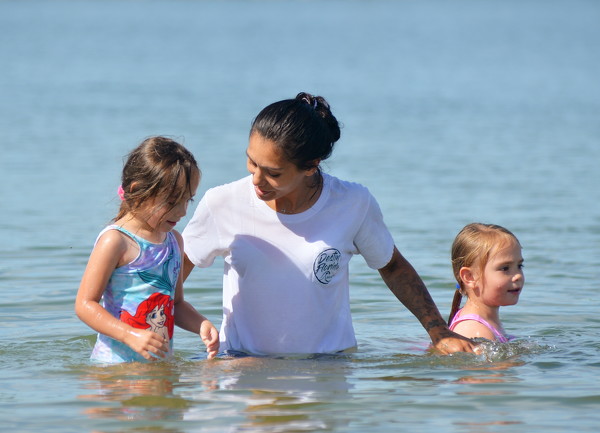
Photo by Paige Sutter/The Daily Standard
Ronica Perez and her twins Emma and Journey Perez of Celina take a swim in the Eastview Park pond in Celina on Friday afternoon.
She said parents should always supervise children around water.
"Lifeguards are there to enforce the rules and prevent drowning," Meinerding. "The number one reason why we enter (the water), specifically in Celina, is that the child is unsupervised or the child is extremely tired and push themselves beyond what they think they're capable of. Children may know how to swim, but they don't necessarily know their own limitations."
Children don't realize they're tired when in the water and push themselves until they get exhausted, she said. They often don't realize this until they're already struggling.
"Parents need to educate their kids, teach them to swim near a lifeguard, recognize the depths of the pool and know where they can or cannot swim," she continued.
Meinerding said Celina lifeguards enter the water more frequently because the water slide has turbulence. Young children don't realize how powerful it is and it takes them under.
"Recognize that you could do the best swimmer and still get fatigued," she said of personal awareness while in the water. "Anybody could drown, so that's why it's important to be safe around the water. Follow the rules."
According to Red Cross, swimmers should reapply a broad-spectrum sunscreen every two hours, avoid swimming alone, enter the water feet first and check for a lifeguard.





